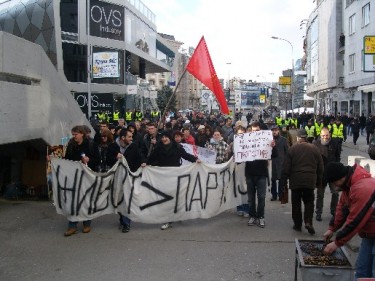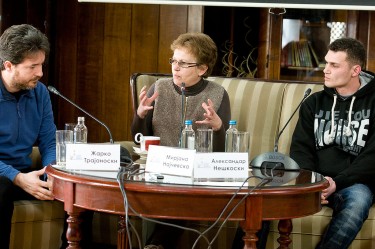This post is part of our special coverage Macedonia Protests 2011.
The trial of the policeman suspected of beating a young man to death while on duty as the Prime Minister's bodyguard during the celebration of election victory on the night between June 5 and 6, 2011, ended on Monday, January 16. The police officer, Igor Spasov, member of the special forces and the only person on trial for the murder of Martin Neshkoski, received a sentence of 14 years in prison.
The attempt to cover up the murder sparked a protest movement against police brutality, through which citizens of Macedonia demanded justice, including apprehension of all accomplices, command responsibility, and political responsibility. The public prosecutor denied [mk] the victim's family's formal request to press criminal charges against the known and unknown accomplices, such as the policemen who were nearby during the murder and contaminated the crime scene afterwards, as well as those who were involved in the cover-up attempt.
The trial had a dozen sessions that were not extensively covered and analyzed by most of Macedonia's media, which rely on revenue from advertisements paid from the state budget. A notable exception is the portal PlusInfo.mk, which published a retrospective of the case [mk] the day before the sentence was announced.
Justice for Martin blog published a summary [mk] of the first ten sessions of the trial, written by activist Voislav Stojanovski's and first published [mk] by Radio Free Europe:
Igor Spasov's Account
On June 5, 2011, while coming to Skopje from Kumanovo (where he had worked on providing security for the electoral process for 15 hours), Spasov's superior officer gave him an oral command via telephone to continue guarding the Prime Minister Nikola Gruevski [photo 1, photo 2]. Before the incident on the square, he had noticed Martin trying to approach the PM twice […]. These attempts were prevented by the PM's security detail. The third attempt happened near the election celebration stage. Even though the uniformed policemen had warned him, Martin kept trying to approach the stage. Spasov reacted shouting at him, “Where do you think you're going?” – Martin started running away, and Spasov ran after him. Persistent attempts to breach the security cordon were suspicious, and his task was to arrest [Martin] and take him to the police station. When Spasov got near him, Martin tripped on a wire, hit his head on the pavement, and remained on the ground. Thinking he was simulating, Spasov kicked him a bit with his foot. The policeman saw that the young man was unconscious and tried to resuscitate him. Soon, uniformed policemen arrived at the scene and called an ambulance. Spasov told his colleagues that he needed to return to the [VIP] stage, and they let him go, without requesting him to identify himself. […] Later, during the trial, Spasov revealed that after the incident he filed an official report, which was destroyed by his superiors.
Eyewitnesses’ Accounts
Most of the eyewitnesses could not confirm that the attacker they had seen was Spasov. Unlike at the time of the incident, in court he appeared much slimmer, with grown hair and beard [photo]. Very few witnesses confirmed his account; most provided quite a different version of the events.
According to them, upon reaching Martin, Spasov hit him in the back with his fist. Martin fell but managed to support himself with one hand. Trying to rise, he shouted “Don't beat me,” but Spasov right away dealt him several lightning strikes in the head with both hands, and then he hit Martin's body with his feet. Some eyewitnesses described the assault's brutality visually, through gesticulations. One of them said that he had seen such bloody beating only in the movies, while another said he could not sleep at night after that. Witnesses who tried to approach Martin were prevented by another corpulent man who identified himself as a plainclothes policeman. Some of them were told, “get lost or you'll get some yourself.”
Accounts of other police officers
The first uniformed policemen arriving at the crime scene confirmed they had spoken to Martin at the stage. After the rush, they were called by people from the crowd, and when they arrived there, Spasov told them Martin got sick. One of the policemen said he did not ID anyone, nor did he ask the people gathered around what happened. According to him, this might have been a mistake. They didn't ID Spasov because he looked like a person from the security detail. They did not notice traces of violence on Martin. Next on the scene arrived a female medical doctor and a nurse, who confirmed the death, but did not notice traces of violence. The CSI squad members who arrived next noticed injuries and defensive wounds on Martin's face and body. They informed the Ministry of the Interior's Operative Center of eyewitness accounts about the chase and physical assault.
Some ten policemen from Spasov's unit who were at the square that night also appeared in Court. Spasov claimed that–like him–they were also on duty at that time. All of them, without exception, denied this and stated that they were on the square as regular citizens, and that their work engagement ended before midnight. Even though these witnesses had the most contradictory statements… they supported the official position of the Ministry of the Interior that they and Spasov work for the day had ended at 23:30, i.e. before the election victory celebration started. During the last session, the Court stated that to qualify the act as “murder” the fact whether Spasov was on duty or not was irrelevant. This ended his efforts to prove that he was at his workplace at the time [Remark: this is related to the issue of command responsibility.]
Experts’ testimonies
During [the tenth] session, the reasons for Martin's death were examined. A neuro-psychiatrist and a psychologist stated that Spasov was an extrovert, an ambitious and persistent person, insecure in the area of emotional control. During the event he was mentally capable, and was provoked by Martin's attempt to escape as a challenge to his power. Forensic experts described the over 20 external and internal injuries caused by direct or indirect punches. Cause of death was bleeding in the brain, caused by direct application of blunt, dynamic, fast and short-term force, which excluded the possibility that he died because he hit his head on the pavement.
Prof. Mirjana Najchevska documented [mk] many procedural mishaps during the first session of the trial, related to violating articles 309, 314, 320, 327, 333, and 335 of the Criminal Code by the female judge who acted very friendly to the audience:
- failing to provide an appropriate courtroom to enable adequate access by the audience, including the victim's family;
- the judges were not introduced, and the sequence of trial elements proscribed by the law was not followed;
- the official accusation was not read publicly – instead, the accused was invited to give his account;
- there was no official recording of the trial in audio or through shorthand minutes;
- the judge in effect warned the accused not to reveal classified information related to his work engagement by telling him this could constitute another criminal offense, even though Article 20 of the Law on Classified Data states that classified information “is no longer considered classified if it covers up a criminal act, overstepping or abuse of function, or other illegal act or deed.”
Before the trial ended, the movement against police brutality organized several public debates. During one of them, an important issue “neglected” by the court was raised. Activist Tamara Atanasoska recounted [mk] on her blog:
[A lady from the audience who presented herself as a professor who teaches criminal evidence subjects to postgraduates] asked where the recordings from the video cameras at the square were? Alongside numerous state-owned surveillance cameras, there are also cameras from private companies like T-Mobile, which can be obtained without problem with a Court Order […]. She also stated that in Great Britain surveillance recordings are “top evidence.”
Deputy Ombudsman was asked if the recordings could be requested, and he responded that it was outside of their competence. As previously the Ombudsman representative commended his institution for doing everything they could, the lady asked if they requested the recordings during the investigation?
The response, as expected, was – no.
Spasov appeared clean-shaven, bald and muscular again while giving his closing statement (photo). He claimed [mk] he did not strike the death blow to Martin's head and pointed at involvement of other policemen: “I believed that the fall caused the boy's death, but if you carefully observe the postmortem photo, you can see that the surface of the bruise near Martin's nose is too big for a fist blow, while the Court did not even examine the option of the previous hit through headbanging…”
Spasov said [mk] that he had his reasons for not telling the whole truth and directly addressed the family. If he knew the youth was wounded, he would have brought him to hospital. He said “God is his witness” and alluded that he was being used as a scapegoat: “…if you look for an accused – here I stand, but if you want the truth, don't look at me!”
After the Court announced the sentence, the movement against police brutality organized a street protest in Skopje [mk], demanding full responsibility for all those involved in the crime.

Protest after the passing of the sentence in Skopje. Banner says "Life > Political Party". Photo by Plusinfo.mk, used with permission
On January 19, the movement “Citizens for European Macedonia” held a public debate on the topic of “Accomplices in the Crime” [mk, full video available within the article]:
According to human rights expert Mirjana Najchevska, the accomplices are all persons who influenced the course of events during and immediately after the murder. These include the public prosecutor and the investigative judge who failed to visit the crime scene on time, and did not secure the area; the policemen who did not detain Igor Spasov, but helped him move the body; and other state organs, involving those persons who tried to cover up Neshkoski's murder. For Najchevska, the act of killing, the investigation, and the court process represent an act of state torture. An indicative fact is that the Court did not declassify the official secret status of police data, even though it could have done it without asking the Ministry of Interior for permission.
Martin's brother Aleksandar Neshkoski stated that the police officers brought in as witnesses provided inconsistent/illogical statements, and the judge interrupted and ended the testimonies of all who wanted to provide more details, without asking further questions. Aleksandar expressed disappointment with the investigation and the trial. As an example of involvement of the highest state organs, he noted the fact that Martin had his ID in his pocket, but the Ministry of the Interior hid his identity for two days after the murder. The victim's brother said that the family dis not think Spasov's sentence was satisfactory and announced seeking responsibility of all the accomplices – if necessary, through the European Court of Human Rights in Strasbourg.
During the Q & A part, Aleksandar pointed out that he was receiving direct threats on a daily basis, but that he was not scared and would continue to seek justice.

Zharko Trajanoski, Mirjana Najchevska and Aleksandar Neshkoski at the public debate in the GEM Club in Skopje, Jan 19, 2012. Photo: Vancho Dzambaski, CC BY-NC-SA.
This post is part of our special coverage Macedonia Protests 2011.






